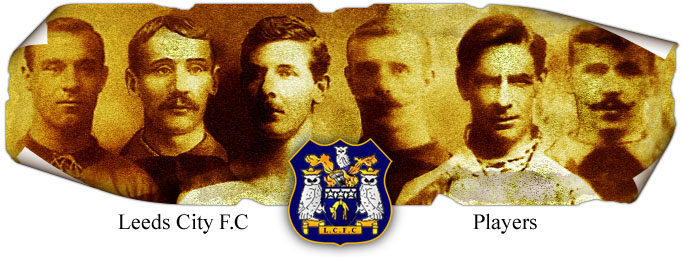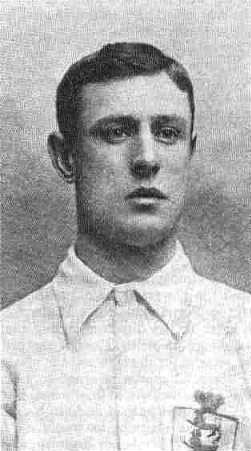

Spiksley: Frederick (Fred)
1904-1905
Outside Left
Born: Born: Gainsborough: 25-01-1870
Debut: Unknown: Unknown
Height & Weight: Unknown
Spiksley initially played as a junior for Gainsborough Jubilee Swifts. In 1887 he helped
them reach the semi-finals of the Lincolnshire Junior Cup, finishing the competition as top
scorer with thirty-one goals in six games. On 19th March 1887 at the age of seventeen he
made his senior debut for Gainsborough Trinity in a game against Notts Jardines. Although
Trinity lost 3-1, Spiksley created the teamís only goal, providing his captain Billy Brown
with a simple tap in after a good run. During his first season at Trinity he scored
thirty-one goals in twenty-nine games and was the teams second highest goal-scorer behind
Jack Madden, who later played for Scotland and Celtic. He also scored twice on both his
F.A. Cup debut, a 7-0 victory over Boston Town, and in the final of the Gainsborough News
Charity Cup. In his second season Spiksley scored twenty-eight goals in twenty-one games
and, despite breaking his leg on his nineteeth birthday in a Gainsborough News Charity cup
tie against The Wednesday, he was the team's leading goal-scorer for the 1888-1889 season.
During the 1889-90 season Spiksley won a cup double, helping Trinity win both the
Lincolnshire F.A. Cup and the Gainsborough News Charity Cup and during the 1890-91 season he
was a prominent member of the Trinity team that won the Midland League. In January 1891 he
almost signed for Accrington Stanley but asked for time to consider their offer before
signing. However while travelling to Accrington he stopped in Sheffield and was persuaded by
two directors, John Holmes and Fred Thompson, to sign for The Wednesday. He subsequently
spent the next eleven seasons at The Wednesday scoring one hundred goals in two hundred and
ninety-three League appearances. He also scored a further fifteen goals in twenty-seven F.A.
Cup appearances. He scored twice in the 1896 F.A. Cup Final as The Wednesday beat
Wolverhampton Wanderers by 2-1. Along with his two goals, Spiksley's back heels stole the
show during the Final. He also helped them win the Second Division Championship in 1900 and
the First Division Championship in 1903. He joined Glossop North End in 1904, but only
played four League games, before joining Leeds City, who were playing friendlies against
Football League opposition as well as fulfilling their West Yorkshire League fixtures. He
played seven games for Leeds. In the 1905-06 season he joined a new club called Southern
United, but the London-based club did not last long and he moved on to Watford where he
scored five goals in eleven games before finish his playing days with a goal in his only
game with Corinthians in 1907, where he became the only professional player ever to play for
the club. In his International career, Spiksley played seven times and scored five goals for
England and helped them win the Home Championship in both 1893 and 1898. In 1893 he scored
twice on his debut against Wales in a 6-0 win. He then scored a further two goals in a 5-2
win over Scotland. In 1894 he scored his fifth goal in three games in 2-2 draw with Ireland.
On 14th March 1903 Spiksley also scored once for the Football League in a 3-0 win over the
Scottish League at Parkhead and in all represented the Football League twice. After retiring
as a player in 1906, Spiksley embarked on a well travelled career as a coach. In 1911 he
accepted a position with AIK Stockholm and guided them to the Swedish Championship. He was
briefly appointed coach of Swedish National Team. By 1913 Spiksley was in Germany, first
with TSV 1860 Munich and then Nuremberg. However while there, the First World War broke out
and Spiksley and his son, Fred Jr, were interned at Ruhleben, a civilian detention camp near
Berlin. The camp contained between 4,000 and 5,500 prisoners and gradually a mini-society
evolved and football became a popular activity. Spiksley was one of several former
professional footballers in the camp. Cup and League competitions were organised and as many
as 1,000 attended the bigger games. Spiksley escaped from Ruhleben in early 1915 and, after
briefly returning to England, he sailed to the U.S.A. and worked in a munitions factory in
Pittsburgh. By 1918 he was working as a coach in Spain. In 1921 he returned to the U.S.A.
and eventually made his way to Mexico. He then returned to England and between 1924 and 1926
and he worked as an assistant coach at Fulham. During his time at Fulham the club embarked
on a successful F.A. Cup run and knocked out an Everton team that included Dixie Dean. He
subsequently returned to Germany and rejoined Nuremberg, who he led to the German
Championship in 1927. Between 1933 and 1936 Fred took over coaching responsibilities for the
King Edward VII School Football team in Sheffield. During his time there the First XI were
unbeaten against school opposition. He later worked as a Bookmaker and died at Goodwood
Racecourse on 28th July 1948 at the age of seventy-eight.
| Appearances | Goals |
| Friendlies 7 | Unknown |
| |
| |